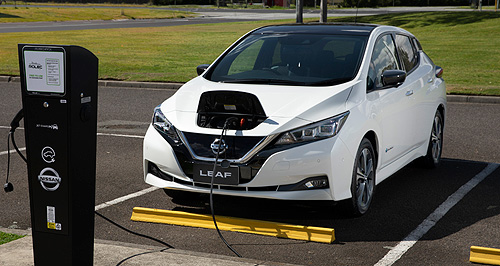Make / Model Search
News - General News - Electric VehiclesSenate committee urges action on EV uptakeHear ye, hear ye: A Senate committee on electric vehicles has handed down its report after a seven-month investigation and called on the federal government to accelerate Australia’s EV adoption rate. Incentives, stricter emissions, sales targets could be used to increase EV sales1 Feb 2019 By TUNG NGUYEN AFTER seven months of investigation, a bipartisan Senate committee on electric vehicles has urged the federal government to take a more proactive role in the adoption of emissions-free motor vehicles in Australia.
Chaired by independent senator Tim Storer and including Labor’s Kim Carr and David Smith, Greens senator Janet Rice and Liberal senator Dean Smith, the Select Committee on Electric Vehicles handed down its 197-page report this week with 17 recommendations to “facilitate and accelerate EV uptake” – starting with an overarching national policy.
The policy would include standards and regulation for charging infrastructure, electricity grid integration, public safety, consumer protection, skills training and the disposal or reuse of batteries.
The report also suggests that the national government set EV sales targets for private, commercial and fleet use, while tightening emissions standards and increasing the use of emissions-free trucks and buses.
Other recommendations include a public EV education campaign, bringing the international Formula E Championship to Australia and working with car-makers and energy providers on a 10-year plan.
In total, the committee took 137 submissions from individuals and organisations, held public hearings around the country and conducted site visits to Nissan’s casting plant and EV-maker SEA Electric in Victoria, EV charge firm Tritium in Queensland and emissions-free bus-maker Precision Buses in South Australia.
The report concluded that: “Widespread use of EVs in the Australian transportation fleet would deliver significant economic, environmental and health benefits to Australian consumers and society.
“It would also create new opportunities for Australian industry.
“There would be challenges associated with increasing EV uptake, but they can be managed with well calibrated regulatory settings.”
According to a PricewaterhouseCoopers analysis submitted to the committee, there could be an increase of $2.9 billion in Australia’s GDP, an additional 13,400 jobs and another $3.2 billion invested into charging infrastructure if the local uptake of EVs hits 57 per cent by 2030.
Furthermore, the Australian Electric Vehicle Association of Victoria also found that as much as $500 million a year could be saved in fuel costs, and $100 million per annum on maintenance, for every million EVs on Australian roads.
On an individual level, the Electric Vehicle Council (EVC) presented data that showed owners could save $2326 per year in ownership costs, which is expected to increase as battery technology becomes cheaper to produce and more emissions-free models hit the market.
An increase in EV adoption will also reduce greenhouse gas emissions, of which light vehicles make up around 19 per cent of Australia’s total, and improve air quality and health.
The report also listed many of the challenges involved in moving towards EVs on any great scale, including driver range anxiety, parts and servicing, a cut in fuel excise revenue, increased demand on the electricity grid and a transition of jobs away from oil-based logistics.
According to the Victorian Automobile Chamber of Commerce (VACC), up to 6000 jobs and 2000 businesses could be at risk in the state if EV sales as a percentage of the total new-vehicle market hit 20 per cent by 2030.
However, the VACC also acknowledged that new opportunities could be created in manufacturing, using remnants of the supply chain and skilled production workforce previously employed by Holden, Toyota and Ford before they closed their car-making operations in 2016/17.
“Whilst passenger car manufacturing has now ceased, it is not beyond possibility that the assembly of EVs may become a viable business option,” the VACC said in its submission to the committee.
“Given the inherent residual models involving the importation of electric motors and the assembly of EVs from completely knocked-down packs (CKDs), using robotics and other automated processes may be viable.”
To support uptake, the report outlines a number if incentives that could apply to EVs, including monetary subsidies, abolishing the luxury car tax, removing import duties and waiving GST.
Last year, just 1352 electric and 14,328 conventional hybrid vehicles were sold in Australia, accounting for just 1.4 per cent of the overall market in which 1,153,111 new vehicles were registered.
According to the report, there are around 17 million light passenger vehicles in Australia, of which only 7300 are battery electric and plug-in hybrid vehicles, or roughly 0.04 per cent.
Globally, 3.1 million EVs were sold in 2017, with China responsible for more than half the sales, followed by the United States.
By 2030, however, Bloomberg New Energy Finance expects that number to increase tenfold to 30 million – or 28 per cent of global sales – with the world’s cumulative EV carparc expected to sit between 125 and 220 million.
The report said if action was not taken, Australia could be left languishing behind with older technology as EV sales increase worldwide, echoing statements made by various car companies including Volkswagen Group Australia.
“In the absence of appropriate regulatory settings, Australia’s near-term EV uptake is likely to be modest,” the report said. “Slow uptake will continue to result in EV manufacturers not prioritising the Australian market and fewer EV models being available to Australian motorists.
“It will also delay the realisation of substantial economic, environmental and health benefits, and risk seeing opportunities for economic development pass by.”  Read more22nd of January 2019  NSW government pledges $5m to EV charging stationsElectric vehicle focus for New South Wales government as state election looms7th of December 2018  Redarc sets sights on EV infrastructureAussie charging network a goal for Redarc and Norwegian EV infrastructure firm Defa |
Click to shareGeneral News articlesResearch General News Motor industry news |











Facebook Twitter Instagram